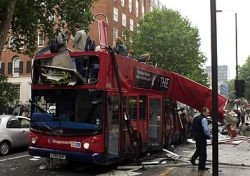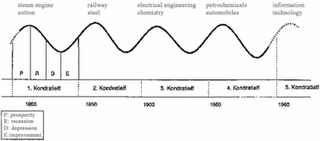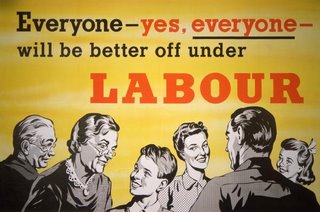 PIONEERING A FUTURE LABOUR MOVEMENT BY REMEMBERING THE BEST OF THE PAST AND APPLYING ITS SPIRIT TO PRESENT MATERIAL CONDITIONS
PIONEERING A FUTURE LABOUR MOVEMENT BY REMEMBERING THE BEST OF THE PAST AND APPLYING ITS SPIRIT TO PRESENT MATERIAL CONDITIONSThe image above is a poster from the successful Labour Party election campaign in New Zealand in 1957. One of the more interesting voices to emerge in the increasingly febrile Labour leadership arena is that of former Rhodes Scholar Bryan Gould - somebody once in the fray of Labour politics in the UK, but whose perspective is now enriched by the time, space and distance of a return to his native New Zealand. Gould's analysis of the 'stewardship' of the party by Mr.Blair is that he "has lost it, he's living in a world of his own, and - as most will say - he's deluded on Iraq." Agreeing with Clare Short MP, Gould sees 1997 as an "unparalleled opportunity for change" (Short likens it to 1945) - and an opportunity that has been profoundly wasted. For Short, under Neil Kinnock and John Smith Labour had "prepared itself for power as a modern Social Democratic party. Tony Blair brought extra gloss but we were already set to win. New Labour has done a lot of rewriting of history."
Whatever the arguments within the Labour movement over the stewardship of Kinnock and Hattersley, it must never be forgotten that the Zinoviev letters in the daily newspapers that helped prevent a much-needed Labour Government in 1992 were often racist, as well as infantile and idiotic. Would any self-respecting journalist refer in public to somebody who is Chinese, or Indian, or Pakistani, or Iraqi in the same vile terms as the phrase 'Welsh Windbag'?
WHY DO TOTALITARIAN REGIMES RE-WRITE HISTORY?
I studied Modern History at St.Anne's college, Oxford, from 1996 to 1999, under the wise tutelage of Peter Ghosh and Dr.Jill Lewis. For my third-year extended essay I answered a question entitled "Why do totalitarian regimes rewrite history?" As I cobbled together a mosaic of fragments from Nazi Germany, Stalinist Russia, and Mussolini's Italy into some form of narrative I did not realise that the country I had grown up in was about to undergo a form of attempted totalitarianism of its own - a mixture of militarism and privatisation, marketisation and media manipulation, infantile control of public discourse and messianic leader cult collected under the rubric of 'New Labour'.
Things could only get better. I was as enthusiastic about the General Election of 1997 as many of those around me. It is hard to remember now how unified people were, such was the appetite for change from the Conservative Governments of the 1990s, who were addled by the corruption which festered as a result of the atrophy of the initial energy of the Thatcherite neoliberal revolution, and arguable Hayekian hijacking, of traditional paternalistic Conservatism. It is a lamentable fact of history that 'New Labour' proved to be the total antithesis of everything in the Labour movement's proud heritage, and proved to be a continuation of that Thatcherite revolution, albeit commandeered by figures with a certain rootedness in Labour tradition such as Peter Mandleson and Philip Gould. Leo Abse, who is one of the most successful backbench Labour parliamentarians of all time, saw the dangers ahead, drawing parallels between 'New Labour' and former Labour MP Oswald Mosley's fascist New Party in his 1996 book Tony Blair: The Man Behind the Smile, now reprinted as Tony Blair: The Man Who Lost His Smile.
NEW LABOUR: THE NEW PARTY
Abse took Roger Griffin's definition of fascism in The Nature of Fascism as 'palingenetic ultra-nationalism' and applied it to the nascent force of 'New Labour'. 'Palingenetic' refers to the tendency towards the creation  of mystical cults of rebirth, and ultra-nationalism speaks for itself. 'New Labour' has proved to be both (with the aggressive ultranationalism of foreign invasions and occupations rebranded as 'humanitarian interventions' or 'just wars').
of mystical cults of rebirth, and ultra-nationalism speaks for itself. 'New Labour' has proved to be both (with the aggressive ultranationalism of foreign invasions and occupations rebranded as 'humanitarian interventions' or 'just wars').
The current clamour for an empty 'renewal' based on a new layer of packaging rather than an unbranding of the entire party is part of how a totalitarian project functions. The initial cycle is sparked by grandiose promises of glorious change and a revolution ('New Labour/New Britain'); as the reality fails to conform to the initial hyperbole, so endless cycles of fresh change are called for, ever faster (permanent) revolution, the insatiable and relentless acceleration of the 'reform agenda'. To accompany all this, venerable elders like Leo Abse and Walter Wolfgang are willfully marginalised and ghettoised, since their wisdom is threatening. In this particular example, the messianic leader cult took on a strange form, reflecting the infantilism, sado-masochism and vapid celebrity obsession of the wider tabloid culture.
This was a messiah by sofa, a messiah of light entertainment, a messiah of soundbites and spin, a messiah of Downing Street soirees with pop stars. It was the worst tendencies of Wilsonian Labour, without any of the merits or intellectual rigour (Wilson secured an outstanding degree in politics, philosophy and economics and became one of the youngest Oxford dons of the century). It was also, crucially, a messiah that incorporated itself dangerously in the Murdoch empire. Mr.Murdoch is the Citizen Kane, or William Randolph Hearst, of our age. He has proved on several occasions that his business practices are not compatible with Labour politics, from the Wapping dispute to the debacle of disgraceful Sun newspaper headlines on the Hillsborough disaster. Oasis frontman Noel Gallagher now describes the resulting desert, aptly, as the "death of politics".
politics".
The state we are in has not withered away, and the brave new world we are in is no utopia, so it is not the death of politics. In the words of John Harris, "So Now Who Do We Vote For?" These words shall be the epitaph of the 'New Labour' era, for their influence on other parties and the entire everyday working of politics has been so profound that alienation is at levels unprecedented since the woefully limited property franchises of the Chartist age.
'Blairism', like Thatcherism, has been mesmeric. Hypnosis and the telescreen are useful tools to a totalitarian. Following Philip Gould and Charles Saatchi, our entire mainstream political culture is now dominated by the connection between politics and advertising outlined by Adolf Hitler in Mein Kampf: the intellectual level is "adjusted to the most limited intelligence among those it is addressed to"; messages are "limited to a very few points and must harp on these in slogans until the last member of the public understands what you want him to understand by your slogan" and political discussion "is not to weigh and ponder the rights of different people, but exclusively to emphasize the one right which it has set out to argue for."
The reality under the hype and the hypnosis is no bed of roses. After the past thirty years of Thatcherism and neo-Thatcherism, the welfare state system instituted by the genunine Labour Government of 1945-51 has been all but abolished. As in the 1950s there was to some extent a cross-party consensus called 'Butskellism', so today there has been a consensus called 'Thatcherblairism' - and Hilary Wainwright, the editor of Red Pepper, is right to join the two together. Whatever the words, the underlying reality is that the period from 1997 to today has witnessed the same project enforced by what Lord Hailsham described as an 'unelected dictatorship'. The legacy of that project is bitter: as Michael Meacher MP argues in his Catalyst pamphlet The Politics of Conviction, while some poor people have been lifted up to a limited extent since 1997, the gulf between the rich and the poor has grown larger. We pay everyday for that increasingly disparity, and for the wastage of money on foreign wars that could have been spent on social welfare, in growing social tensions and disintegration.
The essence of Thatcherism was the ruthless promotion of Gesellschaft over Gemeinschaft - the promotion of an alienated network of competitive atoms in place of a mutually self-supporting community of human beings. Instead of crusading against such a philosophy at every opportunity and on every street corner as a genuine Labour party would, New Labour has continued from that essential starting-point. It now spends most of its time attempting to enforce artificial control on the mess that the past thirty years has bequeathed us through arbitrary authoritarian legislation, justified by the spectres of terrorism. If the legislation planned in this year's Queen's speech goes through, we will witness the eighth Terrorism Bill of this 'Government', and the 24th Criminal Justice Bill. In a society of private vices, the natural, organic and co-operative balancing mechanisms of a mutually supportive community that Ferdinand Tonnies identified have melted away like the Siberian permafrost. And as Montesquieu rightly observed, "unnecessary laws weaken the necessary laws." The result is the disintegration of natural social order and an enormous raft of unworkable legislation written in adamantine legalese which the population largely ignores.
There is such a thing as society, and ours is now a cruel and atomised one, divided into a crude binary where 'winners' (who usually 'win' on a fairly arbitrary basis) take all and 'losers' are consigned to an underclass demimonde of ASBOs, Government coercion, an increasingly privatised prison-security-immigration complex and an increasingly punitive welfare system - all of which is fundamentally Elizabethan in its attitudes to proliferating poverty (a poverty which is likely to grow as the economic centre of gravity moves to China, India, Russia, and Brazil - the nascent economic bloc Mr.Meacher discusses in his pamphlet). Mrs.Thatcher's remark that men over the age of 26 who travel on buses are failures displays an appalling arrogance. In 2005 London bus travellers (none of whom were 'failures') were blown up in what is presumed was a terrorist attack; there are enough holes in the official Government narrative to mean that an independent public inquiry is long overdue - and enough doubt to suggest the whole affair may have been a ludicrous diversion.
Things can, indeed, only get better.
POP IDOLS: TOTEMS AND TABOOS
The Political Compass group are pioneers. They have added a 'y' axis of authoritarian/libertarian to augment the traditional 'x' axis of left/right. The synthesis is a new kaleidoscope through which to view politics. Just as DNA has four strands arranged in a double helix, so the Political Compass has four segments divided by two axes.
Nobody displays more graphically and more clearly the
tragedy that has happened in British politics as a whole as a result of the hijacking of the Labour tradition. It has left us with what J K Galbraith termed in 1958 a 'conventional wisdom' whic
h is overwhelmingly, and dangerously, authoritarian-right.
That 'conventional wisdom' in reflected in legislation, in daily newspapers, in everyday conversations. As the totem of a totalitarianism is constructed, so all criticism of that totem is rendered taboo. Every cult of personality is akin to the moai (or giant stone statues) on Easter Island: as Jared Diamond describes in Collapse, there must have been a point when the final tree was felled on the island to feed the last moai, with the result that the island's ecosystem and hence economy and social structure collapsed, leading to civil war. Eric Fromm in the Sane Society draws the parallel between this kind of celebrity-political leader idolatory, its Old Testament prohibition, and Karl Marx's devastating critique of alienation (a concept Marx inherited, and then adapted, from Feuerbach and Hegel):
"What is common to all these phenomena - the worship of idols, the idolatrous worship of God, the idolatrous love for a person, the worship of a political leader or the state, and the idolatrous worship of the externalisations of irrational passions - is the process of alienation. It is the fact that man does not experience himself as the active bearer of his own powers and richness, but as an impoverished 'thing', dependent on powers outside of himself, unto whom he has projected his living substance."
THE EX-FACTOR
This alienation-idolatory is the same fetishisation of the leader that Karl Popper railed against in The Open S ociety and its Enemies. Former Labour MP Brian Magee saw Popper's work as a blueprint for an open, social democratic society. Volume one of that work is dedicated to a critique of Plato and Platonism, and volume two to Marx and Marxism - and in particular its tendency towards historicism, or the belief in predictable historical laws (such as the belief in the iron law that Gordon Brown will be the next Labour leader). Popper drew out two Athenian quotations, one from Plato and one from Pericles, to illustrate the tendency towards either an open or closed society:
ociety and its Enemies. Former Labour MP Brian Magee saw Popper's work as a blueprint for an open, social democratic society. Volume one of that work is dedicated to a critique of Plato and Platonism, and volume two to Marx and Marxism - and in particular its tendency towards historicism, or the belief in predictable historical laws (such as the belief in the iron law that Gordon Brown will be the next Labour leader). Popper drew out two Athenian quotations, one from Plato and one from Pericles, to illustrate the tendency towards either an open or closed society:
For the Open Society (about 430 B.C.):
"Although only a few may originate a policy, we are all able to judge it."
Pericles of Athens
Against the Open Society (about 80 years later):
"The greatest principle of all is that nobody, whether male or female, should be without a leader. Nor should the mind of anybody be habituated to letting him do anything at all of his own initiative; neither out of zeal, nor even playfully. But in war and in the midst of peace - to his leader he shall direct his eye and follow him faithfully. And even in the smallest matter he should stand under leadership. For example, he should get up, or move, or wash, or take his meals. . .only if he has been told to do so, by long habit, never to dream of acting independently, and to become utterly incapable of it."
Plato of Athens
THE SAFEST GENERAL CHARACTERISATION OF THE EUROPEAN PHILOSOPHICAL TRADITION IS THAT IT CONSISTS OF A SERIES OF FOOTNOTES TO PERICLES
Alfred North Whitehead pictured the European philosophical tradition as a series of footnotes to Plato. It is more than that: it is a series of footnotes to this basic division between openness and closedness. The antagonism between the sentiments of Pericles and Plato runs in parallel with the antagonism between the views of the Leveller Colonel Rainsborough and the Cromwellian Henry Ireton in the Putney debates of 1647.
'New Labour' has cultivated a Platonic leadership cult, with an Iretonian sense of the dominance of property rights over all other social values and the socially conservative belief that the real enfranchisement of the multitude leads to anarchy. All of that has been painted in the anodyne celebrity culture of the times.
The conceptual mask of its authoritarian-right leanings has been the vacuuous concept of the 'Middle Way' and the relentless appeal to 'centre ground politics'. The 'Middle Way' or 'Third Way' was a concept pioneered under the corporate-statism of Mussolini. It also re-appeared in the capitulations to Reagan-Bushism of Clintonite 'triangulation'.
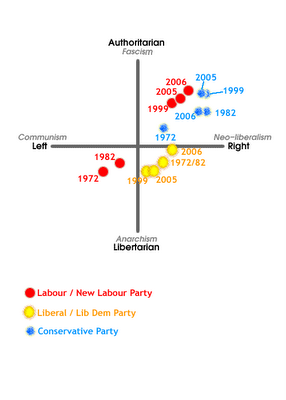
The appeal to the 'Middle Way' is, as Leo Abse argues, a philosophical embodiment of Blairite charisma - an androgynous, hermaphroditic quality which offers us the myth that our leader is simultaneously male and female. While legislating as an authoritarian male, the voice is soothing and almost maternalistic; visibly affable, open, casual, and crafted for the lightness of chat show sofa interrogations just as behind the scenes the reality is cold, closed, dominating, militaristic, torturous and heavy. The unbearable lightness of its outward being has been the seductive force of 'New Labour' from its inception, and it is based on a form of fraud. 'New Labour' is not the proponent of a 'Middle Way' or a proponent of the 'centre ground'. It is authoritarian and right-wing. Each time a 'journalist' fails to interrogate such jargon, but merely reproduces it - as if from the mouth of the cult leaders themselves - they contribute to the downwards spiral of language that Orwell counselled against in his 1946 essay Politics and the English Language.
Politics is composed of conflict. For that conflict to be democratic, physical conflict must be sublimated into the articulation of oppositional visions of society. Democratic conflict requires the art of listening as much as the art of talking. In a true democracy, the resultant conflict of calls and responses is embodied by ideological opposition, rotating Governments, and legislation that fits the real needs rather than false wants of the times. In particular Labour politics is composed of pragmatic attacks on the Gesellschaft and its manifestations - its greed, its vested interests, its monopolisation of wealth, its tendency towards militarism and every kind of arbitrary hierarchical domination based on gender, social class, age, ethnicity, and so on. The corporate state of 'New Labour' is not an attack on the Thatcherite Gesellschaft. It is its extension. It is the extension of the synthesis of neoliberalism, exemplified by the 1986 deregulatory 'Big Bang', mixed with the authoritarianism of the Thatcherite criminal 'justice' system. This potent synthesis has now been extended into every field of life, all under the stolen clothing, banners, words and clauses of the Labour Gemeinschaft - with calamitous results.
As Aneurin Bevan remarked, "we know what happens to people who stay in the middle of the road. They get run down."
What happens to people who take over the vehicle of people who drive on the left of the road, then drive on the right of the road, all the while claiming they are driving in the middle?
SPACESHIP EARTH: THE FINAL FRONTIER
 R Buckminster Fuller, one of the great American visionaries whose vision of 'Spaceship Earth' and the 'World Game' are models for a sustainable future, saw the four points of the compass not as fixed, ossified, and static, but as directions in which one can travel. The Political Compass diagrams display starkly that the movement of Parliament as a totality is overwhelmingly north-east: to a cruel synthesis of authoritarian social policy adulterated with a slavish supplication to the monetarist parable of the unfettered, deregulated global free market.
R Buckminster Fuller, one of the great American visionaries whose vision of 'Spaceship Earth' and the 'World Game' are models for a sustainable future, saw the four points of the compass not as fixed, ossified, and static, but as directions in which one can travel. The Political Compass diagrams display starkly that the movement of Parliament as a totality is overwhelmingly north-east: to a cruel synthesis of authoritarian social policy adulterated with a slavish supplication to the monetarist parable of the unfettered, deregulated global free market.
A real Parliamentary democracy would allow such multiplicity of debate that legislation and Government would move in all four directions of the compass as needed by the people as a whole - and in a real Parliamentary democracy Opposition would be as noble as Government, for the two are interconnected in constant dialogue like the threads of a fugue.
For that to happen, however, each tradition must be itself, rather than pretending to be something that it is not in order to 'win' short-term approval or popularity. The philosophical core of the Labour movement is, has, and always will be democratic socialism. It has a proud and noble history. 'New Labour', which was a youth cult from its beginning - mirroring the unhealthy obsession with youth that pervades the general culture - drew a false distinction between 'Old' and 'New' Labour, banished the true socialist essence from the new concoction, and in so doing eroded a deep heritage. The result is akin to the deforestation of the Amazon rainforest or the glacial retreat Mark Lynas shows through his and his father's photographs in the book High Tide.
RESISTANCE, REBELLION, RECLAMATION AND RENAISSANCE
There are heartening signs of fightback and reclamation. Researchers at the University of Nottingham have pointed out that 114 Labour MPs have defied the party whip and voted against the Government since the May 2005 General Election - an unprecedented level of 'rebellion'. In fact this is not rebellion at all - it is simply the assertion of the Labour heritage; 'New Labour' was, from its inception, an adolescent rebellion against that heritage - adolescent in the sense of Jean-Paul Sartre's rebel, who strikes poses and is concerned by outward expressions, compared with the revolutionary who seeks to change the nature of social reality rather than merely interpret it. The roles of heretic and orthodox have been turned upside-down. The 'orthodox' (though not necessarily dogmatic) are branded 'heretics' (usually with a dismissive term such as the 'awkward squad'), and are gagged, mocked, villified, marginalised, ghettoised, and witch hunted.
This McCarthywasm has not silenced British socialism. The campaign of John McDonnell MP to be the next Labour leader has been gathering momentum, despite the attempted starvation of the oxygen of publicity to it. Reading his alternative Queen's speech - a set of good principles and the good policies that come from them - is refreshing.
McDonnell's campaign is an ambulance in a time of emergency. With a party which has sold its soul and mortgaged its future to authoritarian neoliberalism for short-term electoral gain, with a neglected grassroots (officially half the membership has departed since 1997, let alone the exoduses before), and with a diabolical financial situation, Mr.Blair's 'stewardship' would be remembered for nothing more than the near collapse of the entire Labour heritage should the Metropolitan Police fail to eliminate him from their inquiries in the ongoing 'cash for honours' investigation.
The investigation is, by all accounts, honing in on him and, in particular, his 'city academy' scheme - better known as the attempted abolition of the comprehensive state education system. That abolition has been marshalled by Andrew Adonis, an unelected 'representative' who was appointed because he wrote a newspaper article suggesting that Mr.Blair should run education as well as being Prime Minister. The precedent had already been set for such delusions of grandeur: James Ramsay-MacDonald was not capable of being Prime Minister and Foreign Secretary simultaneously.
 'New Labour' has been characterised by the relentless pursuit of short-term wants over long-term needs. This is entirely in keeping with the neoliberal world view, and the rapidly accelerating levels of global finance being traded since the 1986 deregulation. Such behaviour creates the conditions for the type of collapse Jared Diamond analyses at a macrocosmic level. If there is a collapse in the Labour party, it will be because the majority of healthy trees were felled in order to create dead stone statues. Marx described capitalism as vampiric - living labour being subordinated to dead capital. The living traditions of Labour have been subordinated to the dead Thatcherite revolution. The green shoots of recovery, such as John McDonnell's campaign and the election of four out of six Grassroots Alliance candidates to the National Executive Committee, are heartening. Are they enough to save Labour?
'New Labour' has been characterised by the relentless pursuit of short-term wants over long-term needs. This is entirely in keeping with the neoliberal world view, and the rapidly accelerating levels of global finance being traded since the 1986 deregulation. Such behaviour creates the conditions for the type of collapse Jared Diamond analyses at a macrocosmic level. If there is a collapse in the Labour party, it will be because the majority of healthy trees were felled in order to create dead stone statues. Marx described capitalism as vampiric - living labour being subordinated to dead capital. The living traditions of Labour have been subordinated to the dead Thatcherite revolution. The green shoots of recovery, such as John McDonnell's campaign and the election of four out of six Grassroots Alliance candidates to the National Executive Committee, are heartening. Are they enough to save Labour?
And are they enough to save Parliament from legislation such as the Legislative and Regulatory Reform Act? Currently the level of discourse is deficient for the real challenges of our age - global warming, peak oil, and their geopolitical repercussions.
The British Parliament today too often resembles 'Lanternland', the satirical description of the Council of Trent by Rabelais - a place, in Rabelais's eyes, of supposed illumination, but in reality great confusion and darkness. Reading Hansard today makes one ravenous for a Renaissance.
IMMIGRATION OR (INNER) EMIGRATION?
One of the fields where our mainstream 'conventional wisdom' is most starkly in thrall to the negative attitudes of the tabloids, which manifest the vested interests of their oligopolistic owners, is immigration.
Capital, which concentrates into ever narrower hands, is allowed to circulate ever more freely across the globe - and is always written about in glowing terms, as 'development' or 'progress' or 'economic growth'. The world view of economic liberalism and neoliberalism, from the classical economics of Adam Smith to the monetarism of Milton Friedman, is a form of intellectual conceit: it is predicated on a fable of 'perfect competition' between economic agents. In reality the feverish deregulation of markets over the past thirty years, and the ever more 'free' flows of capital as a result, have led to ever more imperfect competition; capital has not been more widely distributed, but ever more narrowly, and into ever more tax havens and tax loopholes. Never before has wealth redistribution, both globally and nationally, been more urgent than after thirty years of global laisser-faire hegemony. Never has a phrase been such a smokescreen: the 'free' market is really a tyranny. With consciousness of the negative externalities of greenhouse gases now becoming widespread, it is finally being understood that the tyranny operates not merely against exploited workers or against an exploited planet - market failures operate simultaneously against both.
In contrast to capital, labour is enclosed with an ever expanding network of barriers - biometric ID cards; 'security' or, in reality, Apartheid walls; 'removal centres' or, in reality, privatised category C prisons; and the domestic prohibition, since 23rd July 2002, on the ability of asylum seekers to work. These barriers to the circuitry of the flow of labour - a real, live, human flow instead of the vampiric flow of dead capital - are justified through the rhetoric of fear: the discourse of immigration control is connected to terrorism prevention, connected to the fears of the global narcotics industry, connected, ultimately, to fear of the 'Other'.
As Lord May of Oxford observed, the system is upside-down. It rewards the vicious and punishes the virtuous. Mandeville's fable of the bees was a satire, not a blueprint. Global warming is turning the world upside-down: the 'success' of the global North is leading to planetary disintegration; it will also affect the global South the most. If global civil war is to be avoided, a redress of those grievances and the application of justice are urgently required, for there cannot be peace without justice.
LABOURS OF LOVE
Leo Abse urged the recreation of the Labour tradition through the principle of Freud's eros, or life urge; today our land is gripped in the politics of Freud's thanatos, or death urge. Fortress Britain is now a subsection of Fortress Europe. We are isolated, closed, under siege from our own demons - and from the nightmares of our imperial past. The British Empire ended in the ignominy and deceptions of Suez in 1956. Today we are, in Douglas Hurd's words, 'punching above our weight' in Iraq and Afghanistan, and our arrogance is sowing the seeds of devastating future conflicts. In Marshall McLuhan's terms we are looking in the rear-view mirror at an imperial past just as we take to a new road - a far more humble future, where less must be done with less. People from throughout the Commonwealth, and from all across the rest of the world, are right here right now - and in need of provision, representation, welfare and autonomy. Chasing shadows of a nineteenth century Great Game abroad is pure insanity. It is neither ethical nor strategically sensible. Lions are, indeed, being led by donkeys - to an abyss of unwinnable conflict abroad and to rivers of blood at home.
In the tabloid 'discourse' on immigration, virtually nothing is said about emigration or, in other words, the 'brain drain' (immigration is also never referred to as a 'brain gain'). After graduating in 1999 I left Britain to study Japanese in Fukuoka for one year. There were many reasons for this, some personal, but others deeply political. I sought temporary refuge from a culture which seemed to me to be deeply diseased. In Japan I discovered many good things, one of which is a genuine respect rather than a forced soundbite agenda. The accent in social situations is on the group rather than the individual. Walking around Hiroshima and Nagasaki confirmed to me that multilateral nuclear disarmament is not only necessary but one of the few fields that post-imperial Britain could possibly hope to lead the world in.
Upon returning to my native land, I have noticed it becoming more and more diseased - ever less respectful, ever more angry, ever more materialistic, ever more violent, ever more obsessed with hype over reality, ever more repressive, ever more bewitched by absurd bubbles and the lures of snake-oil salesmen. As Orwell wrote in 1946, "most people who bother with the matter at all would admit that the English language is in a bad way". The disassociation between words and realities and the flood of jargon into every field of life - marketing, human resources, public relations, legalese - has led to a kind of collective schizophrenia. The collective consciousness is also suffering from an appalling lack of concentration and attention which pervades an amnesiac politics no deeper than the morning's headlines. The short term is ever shorter, the long term ever deferred. Conversation has become composed of what Stephen Poole calls 'unspeak'.
After the Second World War a debate erupted in Adenauer's Germany which took on the title “die große Kontroverse”, the 'great controversy'. It centred on two opposing attitudes to the Nazi tyranny - on the one hand that of Thomas Mann, who emigrated to the USA and refused to return after 1945 - and that of Frank Thieß, who stressed the moral validity of 'inner emigration'.
As John Donne declared, no man is an island. No island is unconnected - the story of the British Isles is one of tidal waves of immigration and emigration, and were the Gulf Stream to change course or slow down Britain would freeze. However, in times of insanity emigration, either physical or mental and 'inner', become ways of maintaining sanity.
The past is a foreign country: educational trips there involve low carbon emissions. Elsewhere in the world there are states with a better balance in their mainstream political systems. Using the synthesis of lessons from the past and the global present, and with enough creativity, will, and hard work, we may be able to recreate a prosperous democracy in Britain over the forthcoming decades.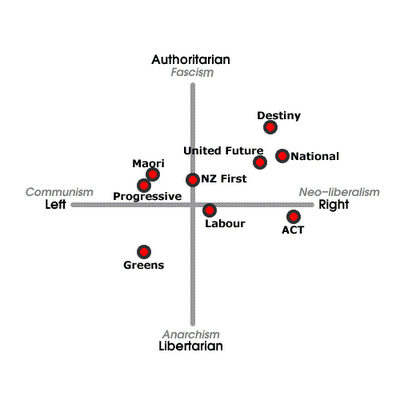
A glance at the New Zealand Political Compass would suggest that their polity is in better shape than ours. Although the Labour party there has also succumbed to the seduction of the shift towards neoliberalism it appears not to have included the social authoritarianism of 'New Labour'. New Zealand's left wing is better represented than the UK's, and also includes a Maori party. Perhaps, slowly, New Zealand is coming to terms with its history of imperialism rather better than Britain - which still believes it is an imperial power, and a democracy with a special mission and manifest destiny to spread representative democracy throughout the rest of the world, despite all the evidence to the contrary.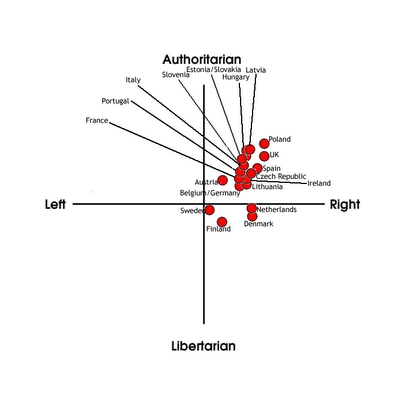
A glance at the European Union Political Compass shows us that the British malaise is not limited to Britain. Europe as a whole seems to have forgotten what it means to be left - in principle, in practice, in policies, and in parties.
Instead of slavishly following a tabloid public opinion, and instead of slavishly interpreting a tabloid public opinion, the point is to educate it, emancipate it, and change it.
NEW WAVE - BOSSA NOVA
Milton Friedman has just died. There cannot be any thinker whose influence is greater upon the development of the hegemony of the neoliberal orthodoxy in the past thirty years than him, apart from possibly Hayek. He was a titanic thinker, whose interpretations supplanted the previous Keynesian orthodoxies of the pre-OPEC oil shocks, and whose insights were the economic base to the political superstructures someone of my age - twenty-eight - has endured throughout all of their existence. Just as John Maynard Keynes was not merely an academic thinker, but actively involved in political life (such as the 1944 negotiation of the Bretton Woods system), so Friedman advised Ronald Reagan.
For those who follow the analysis of Nikolai Kondratiev, the death of the titan of monetarism comes just as we find our first steps, like infants, into a new sixth Kondratiev economic wave. Although many disagree with this way of seeing, and perhaps see it as too rigidly determinist or historicist, those who see validity in the 'Schumpeter-Freeman-Perez' paradigm picture five waves since the beginning of the Industrial Revolution:
- The Industrial Revolution--1771
- The Age of Steam and Railways--1829
- The Age of Steel, Electricity and Heavy Engineering--1875
- The Age of Oil, the Automobile and Mass Production--1908
- The Age of Information and Telecommunications--1971
Furthermore, Immanuel Wallenstein's view that cycles of war are tied to Capitalist Long Waves, with major conflicts occuring on the cusp of new waves, would tie in with the curious episode branded the 'war on terror'. While it is has been rebranded as 'the long war', it remains doubtful whether Richard Bruce Cheney and Peter Clarke's vision of a fifty year conflict will be proved correct; the real concerns of the new wave, global warming and peak oil, dictate that wasteful global wars are simply no longer sustainable policy options.
Just as the Bretton Woods system collapsed in 1971, at the cusp of the information technology wave, so monetarism-neoliberalism is collapsing now. The obsession with enforced 'flexibility' and 'liberalisation' of markets (in terms of capital, not labour) ended, symbolically, in the effective collapse of the Doha Round of World Trade Organisation negotiations.
 The hijacking of the institutions of the Bretton Woods system - the World Trade Organisation, International Monetary Fund, and World Bank - and the collapse of exchange rates fixed to gold reserves led to the subordination of those institutions to the interests of transnational corporations. Nowhere was this domination of the commanding heights of the global economy by the narrowest of oligopolistic vested interests clearer than in the absurdities of World Bank policy, and resultant revolt, in Cochambamaba in Bolivia. By privatising water, and allowing the Bechtel Corporation to dictate to Bolivians that they could not even collect the water from their own roofs, neoliberalism's internal contradictions reached terminal levels, and helped plant the seeds for the 21st century socialism of the Morales Government. The only lesson to be learnt from that miserable episode of inhumanity is that nobody should ever again be permitted to make pecuniary profit from water. Here in the UK the Thatcher Government privatised water supply in 1989. Of all the failed privatisations of that era - policies which require urgent redress and reversal - this is the most ethically disgraceful of all.
The hijacking of the institutions of the Bretton Woods system - the World Trade Organisation, International Monetary Fund, and World Bank - and the collapse of exchange rates fixed to gold reserves led to the subordination of those institutions to the interests of transnational corporations. Nowhere was this domination of the commanding heights of the global economy by the narrowest of oligopolistic vested interests clearer than in the absurdities of World Bank policy, and resultant revolt, in Cochambamaba in Bolivia. By privatising water, and allowing the Bechtel Corporation to dictate to Bolivians that they could not even collect the water from their own roofs, neoliberalism's internal contradictions reached terminal levels, and helped plant the seeds for the 21st century socialism of the Morales Government. The only lesson to be learnt from that miserable episode of inhumanity is that nobody should ever again be permitted to make pecuniary profit from water. Here in the UK the Thatcher Government privatised water supply in 1989. Of all the failed privatisations of that era - policies which require urgent redress and reversal - this is the most ethically disgraceful of all.
NEW WORLD DISORDER
The 'war on terror' has been the infantile conflict that has accompanied the transition from the information technology Kondratiev wave to the peak oil and global warming wave. Mercenaries have always featured in the conflicts of the Military-Industrial Revolution (since the sixteenth century and the crystallisation of the nation-state and standing armies). However, the Iraq and Afghanistan occupations, or indeed colonisations, have seen unprecedented levels of privatisation. The discourse of foreign policy contains references to nation-states or to religious traditions that are in essence smokescreens: these occupations have been those of transnational corporations, in particular arms corporations such as the Carlyle Group (a source of revenue for both the Bush and Bin Laden families) to whom national Governments, and the current unreformed United Nations, are effectively subordinated. It is precisely what President Eisenhower counselled against in his 1961 'military-industrial complex' speech, with the added intoxicant of the outward posturings of 'religious fundamentalism'. As Clement Attlee observed, the ethics of Christianity are admirable but not the mumbo-jumbo. The 'mumbo-jumbo' of the world's religious traditions - their outer garments, rather than inner essences - have been prostituted in order to justify conflicts of resources and status.
As journalists for whom journalism is a vocation like John Pilger and Robert Fisk point out, the 'war on terror' has also witnessed the extension of the wartime binary of 'us' and 'them', 'civilised' and 'barbarous' to absurd levels. On what possible basis can 'our' side claim it is upholding civilised or democratic values when everything from depleted uranium to white phosphorous has been used to destroy human lives and infrastructures? On what possible level of insanity can the notion of the civilised fighting a crusade against infidel 'terrorists' be sustained when the 'civilised' have created a torture camp archipelago, linked with 'extraordinary rendition' flights, whose scale can only be estimated until each one is thrown open to proper scrutiny? On what level of historical amnesia are we operating when we forget the role of the US and UK Governments in creating the conditions for the development of al-Qaeda in the first place in order to destabilise our then 'enemy', the Soviet Union? At what level of self-delusion was Zbigniew Brzezinski operating when he saw the only cost of the Machiavellian machinations in Afghanistan that midwifed al-Qaeda as "a few stirred-up Muslims"? How on earth can anyone be convinced by George W. Bush's facile dichotomy of 'freedom' against 'the terrorists' given his neocon regime's role in virtually destroying the American constitution? Why are we still pretending that our hopeless foreign policy is part of some Grand Chessboard? Why have we not learnt from the disasterous realities of our past 'Great Games' - and why on earth does anyone in 21st century, post-imperial Britain believe there is any validity whatsoever in a foreign policy which is nothing more than a tournament of chased shadows (Турниры теней)?.
In the hubris of 1991 Norman Schwarzkopf claimed that Operation Desert Storm was similar to the crushing defeat imposed on Rome by the Carthaginian Hannibal at the battle of Cannae. It does not take more than half an hour in a library to work out that one of the ramifications of Cannae was the eventual destruction of Carthage by the Romans. For Gore Vidal, the American Republic has already been destroyed - from within, by the Bush regime that the architects of 'New Labour' have courted so assiduously.
 Given the recent excesses of the 'war on terror', humility, withdrawal, apologies, compensation and public, independent inquiries are prerequisites not only of peace - but also the avoidance of a potential 'blowback' of staggering force.
Given the recent excesses of the 'war on terror', humility, withdrawal, apologies, compensation and public, independent inquiries are prerequisites not only of peace - but also the avoidance of a potential 'blowback' of staggering force.
Drama is not merely entertainment. It is education. Since Thatcherism the arts have been neglected and ghettoised, castigated as elitist social luxuries - a shame, since the social lessons of the deepest drama are vital foundations to wise political decision-making as well as harmonious living in a society as a whole.
Hubris, as the Roman's neighbours knew, is always followed by nemesis. And in war, victory and defeat are the two faces of Janus. The ancient Chinese text the Tao te Ching counsels that victory should be celebrated like a funeral.
How should defeat be celebrated?
ECO-LOGICAL ECONOMICS
The monetarist and neoliberal orthodoxies are not attuned to the new territory that we are arriving into, and beginning to explore. For that we will need to make policies whose foundations are in entirely new economic thinking. No longer can we simply use the term 'Industrial Revolution'; from the late eighteenth century onwards a minority of the globe has created a 'Greenhouse Gas Revolution'. From now on, the environment is the real base, the economy a layer above it, and the political and cultural superstructures layered above those. The hegemony of the neoliberal order must be dismantled on all three levels, and replaced with systems that rely on the principle of environmental, economic and social harmony rather than environmental, economic and social 'growth'. The New Economics Foundation's Index of Sustainable Economic Welfare (ISEW) must replace Gross Domestic or Gross National Product (GDP or GNP) as our measure of success. The former is healthy, the latter obese. The former is the way of survival, the latter the way of the dinosaur.
In Milton Friedman's world, the Great Depression was not part of the boom-bust sine wave of capitalism or, in our case, turbo-capitalism: it was a mistake by Governmental agencies and their use of fiscal policies in place of monetary policies.
Under the neoliberal hegemony, and in the information technology Kondratiev wave, fiscal policy has been denigrated as a political tool. The notion of a Government raising taxes on the wealthiest in the name of wealth redistribution has become taboo, and demonised as heretical.
Never before has it been so urgent.
The global warming era highlights global injustice as never before: the poor world pays for the rich world's past and present pollution. The negative externalities writ large force the need for urgent contraction and convergence, and for a new global social and planetary contract. Otherwise the injustices of global negative externalities, particularly those bequeathed from the already questionable legacies of past imperialisms, will lead to the tendency for global civil war.
As Friedrich Engels wrote, an ounce of action is worth a ton of theory.
As an old Japanese saying runs, principle without practice is useless, but practice without principle is dangerous.
It is time for policies, actions, mobilisations, organisations, institutions, philosophies, treaties - but all backed by the fundamental ethical principle that 'the Other' is an element of 'us'; and that the welfare of our neighbours is inextricably interconnected with our own welfare. For that basic principle to become the foundation of global practice is nothing more than a complete, total, non-violent revolution in values and the global systems that we make.
